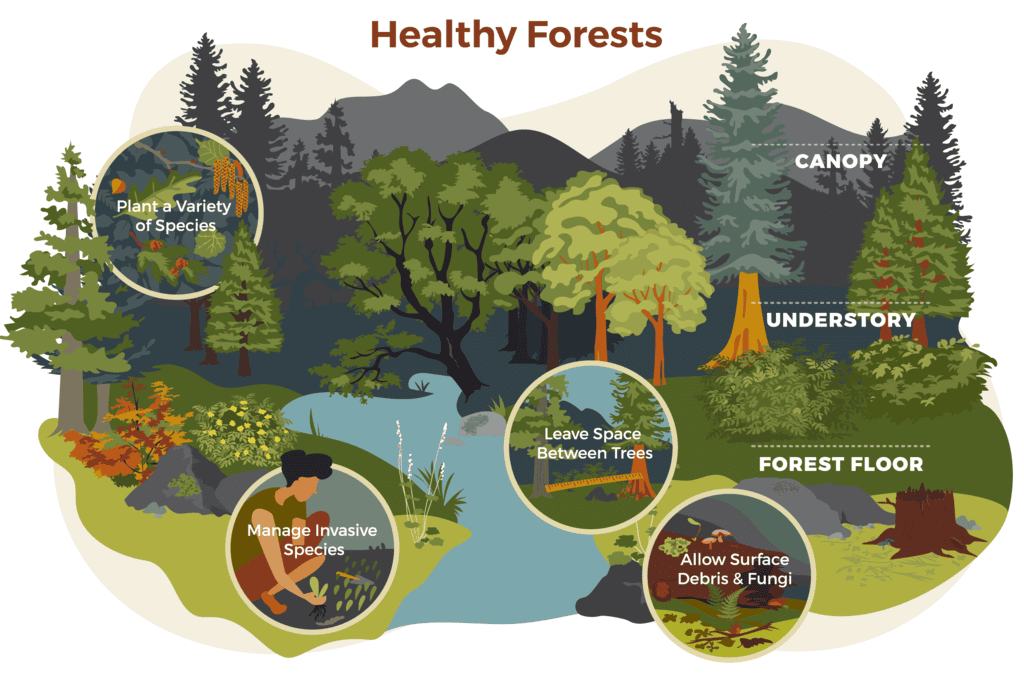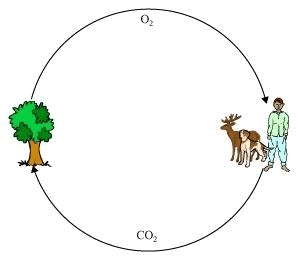NCERT Solutions for Class 7 Science - Forests- Our Lifeline
Q1. Explain how animals dwelling in the forest help it grow and regenerate.
Ans: Animals living in the forest contribute to its growth and regeneration in several important ways:
- Seed Dispersal: Animals help spread plant seeds, allowing new plants to grow.
- Nutrient Supply: Decaying animal dung enriches the soil with nutrients that support plant growth.
- Decomposition: Microorganisms break down dead plants and animals, turning them into humus, which nourishes the soil.
Q2. Explain how forests prevent floods.
Ans: Forests play a crucial role in preventing floods by:
- Acting as a natural absorber of rainwater.
- Allowing rainwater to seep into the ground gradually.
- Reducing the direct impact of rain on the soil, which helps prevent flooding.
- Maintaining the water table throughout the year.
Without trees, rain hits the ground directly, increasing the risk of floods.
Q3. What are decomposers? Name any two of them. What do they do in the forest?
Ans: Decomposers are micro-organisms that convert the dead plants and animals to humus.
Bacteria and fungi are the two types of decomposers. In the forest, decomposers play a vital role by:
- Recycling nutrients from dead organisms.
- Enriching the soil with humus, which supports plant growth.
Q4. Explain the role of forest in maintaining the balance between oxygen and carbon dioxide in the atmosphere.
Ans: Forests play a crucial role in maintaining the balance of gases in our atmosphere. Trees and plants absorb carbon dioxide and release oxygen during photosynthesis.This process helps regulate the levels of these gases, ensuring a stable environment. Forests act as the lungs of the Earth, contributing significantly to air quality.

Q5. Explain why there is no waste in a forest.
Ans: There is no waste in a forest because microorganisms act on the wastes and convert them to humus. This humus ensures that the nutrients are returned back to the soil. Additionally, when animals die, they become food for scavengers, further recycling nutrients back into the ecosystem.
Q6. List five products we get from forests.
Ans: Five products that we get from forests are:
(i) Medicines
(ii) Wood
(iii) Paper
(iv) Oil
(v) Gum
Q7. Fill in the blank:
(a) The insects, butterflies, honeybees and birds help flowering plants in _______.
(b) A forest is a purifier of _______ and _______.
(c) Herbs form the _______ layer in the forest.
(d) The decaying leaves and animal droppings in a forest enrich the _______.
Ans:
(a) The insects, butterflies, honeybees and birds help flowering plants in pollination.
(b) A forest is a purifier of air and water
(c) Herbs form the lowest layer in the forest.
(d) The decaying leaves and animal droppings in a forest enrich the soil.
Q8. Why should we worry about the conditions and issues related to forests far from us?
Ans: We should be concerned about forests for several important reasons:
- Increased carbon dioxide: A reduction in forest area leads to higher levels of carbon dioxide in the atmosphere, which raises the Earth's temperature.
- Soil erosion: Without forests, soil becomes loose and is more likely to erode.
- Flood risks: The absence of trees increases the likelihood of floods, as there are fewer plants to absorb water.
- Wildlife habitats: Forests provide essential shelter and food for animals. Damage to forests threatens their habitats.
Therefore, it is crucial to conserve our forests.
Q9. Explain why there is a need of variety of animals and plants in a forest.
Ans: Variety of plants and animals in the forests helps plants to regenerate and grow. More excellent range of plants supports herbivores, which in turn serve as food for carnivores. Decomposers turn dead animals and plants into humus. Thereby maintaining the nutrient recycling. This wide variety makes forest a dynamic living entity.
Q10. In figure, the artist has forgotten to put the labels and directions on the arrows. Mark the directions on the arrows and label the diagram using the following labels:
Clouds, Rain, Atmosphere, Carbon dioxide, Oxygen, Plants, Animals, Soil, Roots, Water table.
Ans:
Q11. Which of the following is not a forest product?
(i) Gum
(ii) Plywood
(iii) Sealing wax
(iv) Kerosene
Ans: (iv) Kerosene
Q12. Which of the following statements is not correct?
(i) Forests protect the soil from erosion.
(ii) Plants and animals in a forest are not dependent on one another.
(iii) Forests influence the climate and water cycle.
(iv) Soil helps forests to grow and regenerate.
Ans: (ii) Plants and animals in a forest are not dependent on one another.
Q13. Micro-organisms act upon the dead plants to produce
(i) sand
(ii) mushrooms
(iii) humus
(iv) wood
Ans: (iii) humus
|
112 videos|286 docs|28 tests
|
FAQs on NCERT Solutions for Class 7 Science - Forests- Our Lifeline
| 1. What is the importance of forests in our lives? |  |
| 2. How do forests contribute to the water cycle? |  |
| 3. What are the threats faced by forests? |  |
| 4. How can we conserve forests? |  |
| 5. What are the benefits of afforestation? |  |






















